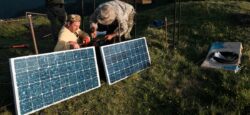Just a guy in Vermont trying to connect all the dots...
Author's posts
Jul 01
US Supreme Court Upholds Right of Websites to Moderate Content

In a decision on the NetChoice cases, the US Supreme Court upheld the rights of social media platforms to moderate content.
The post US Supreme Court Upholds Right of Websites to Moderate Content appeared first on Internet Society.
May 06
Montana’s TikTok Ban: Breaking the Internet and Undermining Online Privacy

Asking TikTok, Google, and Apple to more intrusively track nearly every American with a cell phone, based on the possibility that a TikTok user might enter Montana, would be a significant invasion of privacy. And yet that is the likely outcome if Montana’s law SB 419 is allowed to take effect. A law that claims […]
The post Montana’s TikTok Ban: Breaking the Internet and Undermining Online Privacy appeared first on Internet Society.
Apr 22
AVFTCN 035 – 3 Articles To Read On Earth Day
Today is Earth Day… and when I climb up into that crow’s nest, hold up my spyglass, and look out at the horizon… it can look pretty bleak. It seems like the whole world is on fire in different ways. But amidst the chaos… what gives me hope is seeing people taking action. And they are!
Today I offer you three articles to hopefully provoke some thoughts on this day: one by me and two by others.
”The Internet and Climate Change” – In this article that I published today on the Internet Society’s site, I explored how the Internet is helping address climate change, how the Internet is harming the climate, and how the Internet’s infrastructure is at risk in the face of our changing climate.
I’ve been talking about these topics with many different people, but this article was my first attempt to bring all these thoughts together into one piece. I would love any feedback you have! Was it helpful? Did you learn something? Do you have ideas or pointers to other people working on these topics? Or do you think I have things all wrong? Or are there other articles or papers you think I should read?
Please do let me know any feedback. If you received this via email, you should just be able to reply. If not , you can send it to me at dyork@lodestar2.com .
If you are looking for a speaker or a panelist for a workshop, podcast, webinar, video, presentation, etc. about this whole topic… it’s one I’m looking to spend more time on and I’m eager to engage in discussions about!
“The Staggering Ecological Impacts of Computation and the Cloud” – in this excerpt from a longer case study for MIT Press, anthropologist Steven Gonzalez Monserrate dives DEEP into the data centers that power all the applications and services we use every day. He goes first into energy consumption, offering staggering statistics along the way, including:
The Cloud now has a greater carbon footprint than the airline industry. A single data center can consume the equivalent electricity of 50,000 homes.
He goes on to talk about the enormous amounts of water required by data centers, and then gets into the noise pollution that affects local communities. His excerpt concludes with a section about the huge amount of electronic waste generated from data centers, and some final thoughts.
If you’ve been looking to understand climate impacts of the apps and services we use, this is a great piece!
”We Need To Rewild The Internet” – This is an amazing article by Maria Farrell and Robin Berjon! It’s not about climate change … or anything directly related to Earth Day… but rather it uses the lens of ecology to look at today’s Internet, and to offer suggestions for its future. As they subtitle it:
The internet has become an extractive and fragile monoculture. But we can revitalize it using lessons learned by ecologists.
It’s a brilliant piece! I enjoyed it and found it so powerful that I just may have to write an entire newsletter about it. I probably will… but in the meantime I wanted to get this out to you all.
BONUS: One fourth article to wrap on a hopeful note – if you have not read “Collapse, Renewal and the Rope of History” from the folks at FutureCrunch, do so now! It’s another amazing piece of writing that gets to the core of the stories we tell … to ourselves… and to everyone else.
With that, I wish you a Happy Earth Day! And… the reminder that really every day must be Earth Day if we are to keep living on this pale blue dot of ours! 
[The End]
Recent Posts and Podcasts
Here is some of the content I’ve published and produced recently on my personal sites:
- Celebrating 20 Years as a Wikipedia Editor – and the companion podcast episode TDYR 416 – 20 Years of Wikipedia Editing
- 1,000 Days of Journaling with Day One
- The Github Malware Attack – and the Importance of Trusting the Repository You Use
- New Excellent Analysis of Where IPv6 Grew in 2023
And new posts I wrote for the Internet Society (who has no connection to this newsletter):
- Nevada Wants to Reduce Online Protections for Children: All Internet Users Should Benefit from Strong Encryption
- Protection for Intermediaries Is Vital for the Internet in Mexico
- Major Internet Outages Across Western and Southern Africa Today
- Internet connectivity disrupted in Chad amidst unrest
- 3 Years On, Myanmar’s Internet Service Blocking Results in $232 Million Loss
Thanks for reading to the end. I welcome any comments and feedback you may have.
Please drop me a note in email – if you are a subscriber, you should just be able to reply back. And if you aren’t a subscriber, just hit this button  and you’ll get future messages.
and you’ll get future messages.
This IS also a WordPress hosted blog, so you can visit the main site and add a comment to this post, like we used to do back in glory days of blogging.
Or if you don’t want to do email, send me a message on one of the various social media services where I’ve posted this. (My preference continues to be Mastodon, but I do go on others from time to time.)
Until the next time,
Dan
Connect
The best place to connect with me these days is:
- Mastodon: danyork@mastodon.social
You can also find all the content I’m creating at:
If you use Mastodon or another Fediverse system, you should be able to follow this newsletter by searching for “@crowsnest.danyork.com@crowsnest.danyork.com“
You can also connect with me at these services, although I do not interact there quite as much (listed in decreasing order of usage):
- LinkedIn: https://www.linkedin.com/in/danyork/
- Soundcloud (podcast): https://soundcloud.com/danyork
- Instagram: https://www.instagram.com/danyork/
- Twitch: https://www.twitch.tv/danyork324
- TikTok: https://www.tiktok.com/@danyork324
- Threads: https://www.threads.net/@danyork
- BlueSky: @danyork.bsky.social
Disclaimer
Disclaimer: This newsletter is a personal project I’ve been doing since 2007 or 2008, several years before I joined the Internet Society in 2011. While I may at times mention information or activities from the Internet Society, all viewpoints are my personal opinion and do not represent any formal positions or views of the Internet Society. This is just me, saying some of the things on my mind.
Apr 22
The Internet and Climate Change

As we celebrate Earth Day 2024, the world seems to be on fire. Quite literally with some regions battling extreme wildfires, while other regions are drowning under massive flooding. Sea levels are rising, temperatures are climbing, and ice is melting. Amid all of this, it’s worth pausing and thinking about the Internet’s relationship with climate […]
The post The Internet and Climate Change appeared first on Internet Society.
Apr 21
TDYR-416-20-years-of-Wikipedia-editing
Apr 12
Protection for Intermediaries Is Vital for the Internet in Mexico

We often overlook the factors that enable the Internet to accommodate a wide range of applications, from real-time surgeries to viral memes, and individual expression. Some of those factors are technical and some are policy. A critical policy issue that has shaped the evolution of the Internet is the question: should websites and other online […]
The post Protection for Intermediaries Is Vital for the Internet in Mexico appeared first on Internet Society.
Mar 12
Nevada Wants to Reduce Online Protections for Children: All Internet Users Should Benefit from Strong Encryption

Today we joined an effort to stop the State of Nevada from making it easier for children’s personal information to be obtained by child predators, criminal gangs, foreign nations, and others. The State of Nevada seems to think that children deserve less protection online. Under a misguided view of seeking to “protect” children, the State […]
The post Nevada Wants to Reduce Online Protections for Children: All Internet Users Should Benefit from Strong Encryption appeared first on Internet Society.
Feb 29
The Github Malware Attack – and the Importance of Trusting the Repository You Use
There’s a terrible attack happening against Github right now where attackers are forking legitimate repositories and injecting malware – and then hoping unsuspecting users will download code from the attacker’s repo instead of the original. A researcher estimates this is happening to about 100,000 repos on Github.
As Dan Goodin writes at Ars Technica:
The malicious repositories are clones of legitimate ones, making them hard to distinguish to the casual eye. An unknown party has automated a process that forks legitimate repositories, meaning the source code is copied so developers can use it in an independent project that builds on the original one. The result is millions of forks with names identical to the original one that add a payload that’s wrapped under seven layers of obfuscation. To make matters worse, some people, unaware of the malice of these imitators, are forking the forks, which adds to the flood.
His article continues in great detail about how the attack works and the dangers involved. He also notes how Github is fighting back against this and removing malware repos … but the scale of the attack makes this hard.
A key point to me is that you should only download and execute code from repositories you trust.
This is kind of a 🤦♂️ statement, but it’s so easy to just search for code, find a repo, and use the code.
We all need to take the extra moment and figure out: is this repo a fork of another repo? And if so… why? There are perfectly legitimate reasons to fork a repo. Perhaps someone wants to improve the code or offer a new feature in a way the original developer didn’t want to.
But, as this attack shows, there are also malicious reasons for forking a repo.
We need to be sure we trust the source – which may mean doing the detective work to trace back and see if this is the original repo.
I wish the folks at Github all the best in combatting this attack. The ability to easily fork repos is such a key part of Github and the collaborative development of code. It’s unfortunate that it is being abused in this way. 🙁
Feb 29
New Excellent Analysis of Where IPv6 Grew in 2023
Where did IPv6 grow in 2023? Where did it not? What countries led on IPv6 deployment?
Recently a colleague of mine at the Internet Society, Robbie Mitchell, laid all this out in a long post titled “Governments and Industry Driving IPv6 in 2023”. With data and many charts he walks through where IPv6 deployment is improving and where more work is needed.
I found it fascinating to see how much the Asia-Pacific region is growing, while here where I live in the USA the growth was minuscule (1.7%). Particularly since historically the ISPs in the USA have been strong drivers of IPv6 growth.
I’ll note that if you want to track IPv6 growth, the Internet Society’s Pulse platform has a page about technologies at: https://pulse.internetsociety.org/technologies – on that page you can see data and maps that show IPv6 deployment (as well as for other technologies).
Feb 29
New Excellent Analysis of Where IPv6 Grew in 2023
Where did IPv6 grow in 2023? Where did it not? What countries led on IPv6 deployment?
Recently a colleague of mine at the Internet Society, Robbie Mitchell, laid all this out in a long post titled “Governments and Industry Driving IPv6 in 2023”. With data and many charts he walks through where IPv6 deployment is improving and where more work is needed.
I found it fascinating to see how much the Asia-Pacific region is growing, while here where I live in the USA the growth was minuscule (1.7%). Particularly since historically the ISPs in the USA have been strong drivers of IPv6 growth.
I’ll note that if you want to track IPv6 growth, the Internet Society’s Pulse platform has a page about technologies at: https://pulse.internetsociety.org/technologies – on that page you can see data and maps that show IPv6 deployment (as well as for other technologies).

